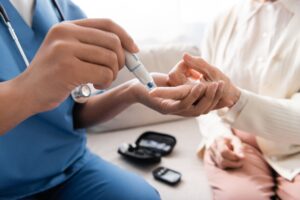
Read on to learn more about the connection between diabetes and PAD and take the proper precautions to lower your risk.
Why Are Those With Diabetes at Risk of Developing PAD?
Those with diabetes are at risk of developing PAD; however, if they are not managing their diabetes, they can increase the likelihood of developing atherosclerosis and PAD. For example, those who are overweight, inactive, have high blood pressure and cholesterol, and smoke may experience an increased risk of further health conditions.
How Can You Prevent PAD?
Making healthy lifestyle changes is the most effective precaution you can take for both diabetes and PAD. Taking the proper precautions to manage your diabetes can further lower your risk of developing PAD. These include:
- Maintaining a healthy weight
- Exercising regularly
- Monitoring blood pressure and cholesterol levels
- Quitting smoking
Working with a physician, you can determine the best type of exercise for you and develop a diet that keeps you satisfied and allows you to maintain your weight. Remember that what works best for one person may not work for you. That means you should not strive for a certain weight, diet, or exercise program if it’s not something you can sustain in the long term.
Monitoring your insulin levels and speaking with an endocrinologist is also beneficial if diet and exercise are ineffective.
Learn More
If you’re struggling to manage your diabetes, or you believe you may be developing symptoms of PAD, such as numbness, tingling, weakness, or pain in the lower extremities, it may be time to speak with a professional. Metropolitan Vascular Insititute can provide a comprehensive assessment to determine if you have PAD. We can then walk you through the next steps and offer treatment from our skilled team of dedicated vascular specialists. Contact our Waldorf, MD, office at (301) 374-8540 to learn more.

